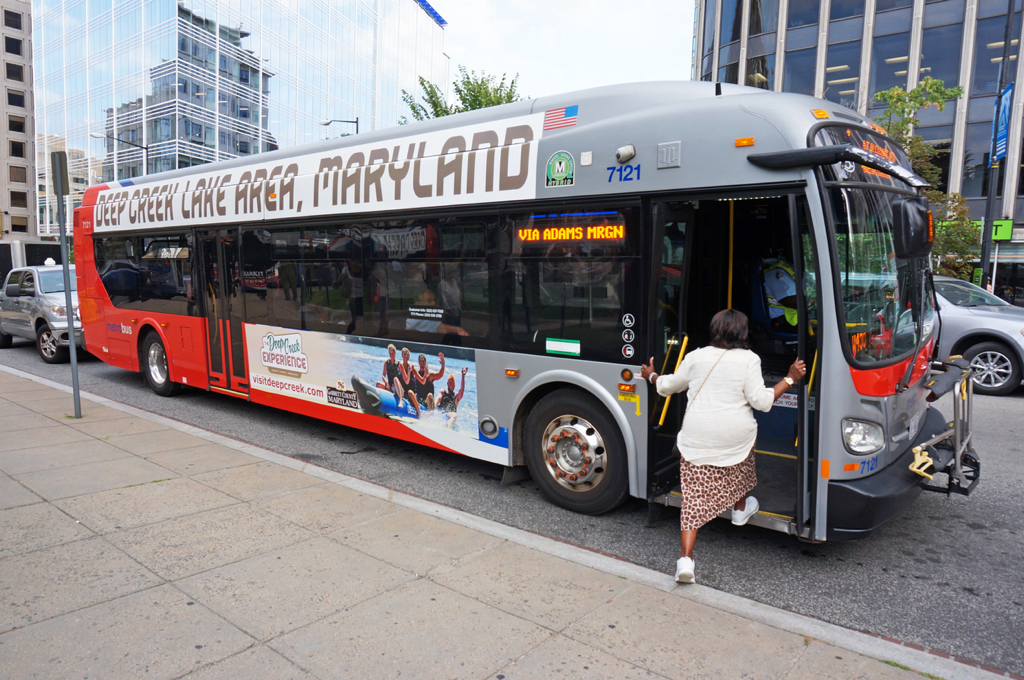The Archdiocese of Washington is the latest entity to sue the Washington Metropolitan Area Transit Authority over restrictions on what types of advertisements can be displayed on Metro-owned property. The archdiocese filed its suit Tuesday in federal court in DC after Metro rejected an ad buy for the church’s “Find the Perfect Gift” campaign because the proposed ad featured a religious scene, which WMATA said was a violation of its rule against ads that promote religion.
The archdiocese had sought to cover Metrobus exteriors in the ad, which directs people to FindthePerfectGift.org and features a drawing of three men and two sheep under a cluster of stars. In its complaint, the archdiocese argues that Metro’s rejection of the ad is a First Amendment violation.
“The rejected ad conveys a simple message of hope, and an invitation to participate in the Christmas season,” Ed McFadden, the archdiocese’s communications secretary, says in a press release. “To borrow from a favorite Christmas story, under WMATA’s guidelines, if the ads are about packages, boxes or bags … if Christmas comes from a store … then it seems WMATA approves. But if Christmas means a little bit more, WMATA plays Grinch.”
The lawsuit itself goes a bit further than Seuss references, stating that “WMATA’s ban on advertisements that promote or oppose any religion, religious practice, or belief has established a regime that is hostile to religion.”
Further down, the document accuses Metro of applying its ban on religious ads erratically:
WMATA has denied the Archdiocese’s “Find the Perfect Gift” advertisements, which contain no explicit references to religion, religious practice, or belief. At the same time, WMATA accepts advertisements that promote yoga practices as a mechanism to “take you on an inner journey of self-discovery” and to lead to the “acknowledgment of one soul to another.” On information and belief, WMATA also accepts advertisements from the Salvation Army, which is an openly religious organization based on Protestant Christian principles. The advertisements promote the Salvation Army’s Christmas-related fundraising activities. WMATA also routinely accepts advertisements that refer to Christmas in the context of promoting commercialism or encouraging consumers to buy more goods and services.
The Salvation Army’s roots in Wesleyan theology might not be as well-known as Christmas lore, but the archdiocese’s suit does seem to be noting some inconsistencies in how Metro allows or prohibits ads. But there’s a bit of reaching here: the Salvation Army’s shield logo and holiday sales at retailers are not overtly religious; the shepherds on the proposed ad for the Find the Perfect campaign are an obvious nod toward the nativity story. The Find the Perfect Gift website doesn’t hide anything either, featuring calendars for Christmas Mass services, volunteer opportunities with Catholic Charities, and guides to other seasonal Catholic rites.

“In 2015, WMATA changed its advertising policy to prohibit issue-oriented advertising, including political, religious and advocacy advertising,” Metro spokeswoman Sherri Ly writes in an emailed statement. “The ad in question was declined because it is prohibited by WMATA’s current advertising guidelines.
Metro contracts with an outside vendor to sell its advertising space, which includes bus interiors and exteriors, railcars, and Metro stations. Bus stations in DC are owned by the city government, not WMATA. The archdiocese wanted to advertise on the sides of buses, rather than city-owned bus shelters, to maximize visibility. “Our ad was designed to be placed on metro bus exteriors to reach the broadest audience and to invite everyone to experience the well-accepted joyful spirit of the season, or to share their many blessings with others less fortunate through service opportunities,” an archdiocese official says in its press release.
Even though Metro doesn’t sell the ads directly, the transit authority retains control over what content is allowed. The guidelines were revised after an organization run by anti-Islam activist Pamela Geller attempted to place billboards featuring cartoon depictions of Muhammad, which is considered offensive to Muslims.
But Metro’s enforcement of its advertising rules has been nothing if not inconsistent since they were updated, especially in 2017. Over the past 11 months ad buyers ranging from a women’s health clinic to former Breitbart editor Milo Yiannopoulos have had their ads yanked down by the transit agency. In August, the clinic, Yiannopoulos, and People for the Ethical Treatment of Animals—which also got rejected by WMATA—joined an American Civil Liberties Union lawsuit challenging the transit agency’s guidelines.
The ACLU filed its suit after Metro rejected a campaign featuring the text of the First Amendment.



















